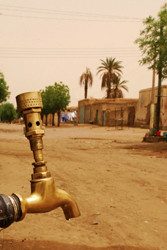Facilitating uptake of effective water, sanitation and hygiene technologies
Advancements in technology have led to the development of innovative water, sanitation and hygiene (WASH) technologies. Yet, implementation of many such technologies has been unsuccessful due to factors such as cost, sustainability and suitability. The EU-funded WASHTECH(opens in new window) (Water, sanitation and hygiene technologies) project aimed to identify the stumbling blocks and help to resolve these issues in order to improve on the quality of life for all people. Project members successfully designed and developed a technology assessment framework (TAF)(opens in new window) for assessing the effectiveness, performance, suitability and sustainability of new technologies prior to implementation. This robust decision-making tool identifies promising WASH technology and determines risks and factors that affect successful rollout. It is intended for national and local governments, development partners, local private sector enterprises, non-governmental organisations, research and development institutions, and universities. The TAF was validated in Burkina Faso, Ghana and Uganda using 13 different WASH technologies. An instruction manual is freely available online. The team developed informative guidelines to implement and adapt the TAF at district and national levels with special attention for the introduction processes of technologies, the Technology Introduction Process (TIP). A series of reports were produced that review existing WASH technologies, document the experiences of the three countries in working with the TAF and present country-specific recommendations. Project partners also established and facilitated learning alliances in the countries. A document was produced to provide guidance on implementing such alliances. Thanks to WASHTECH, relevant stakeholders are no longer hesitant about adopting WASH technologies to deliver sustainable services. Armed with innovative tools and approaches for informed decision making and strategic planning, they can now offer a more respectable and humane way of life to the underprivileged.



